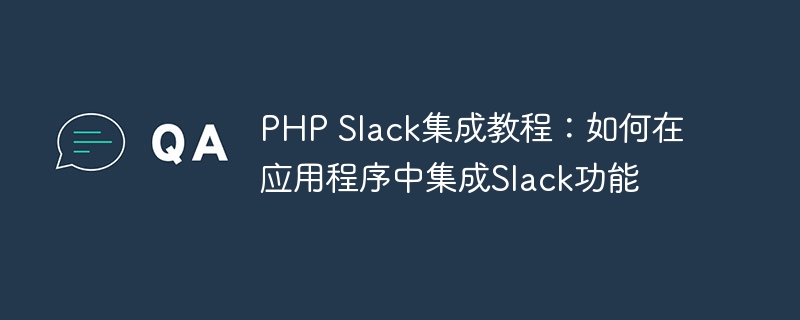Home >Backend Development >PHP Tutorial >PHP Slack integration tutorial: How to integrate Slack functionality in your application
PHP Slack integration tutorial: How to integrate Slack functionality in your application
- 王林Original
- 2023-09-13 11:34:541010browse

PHP Slack Integration Tutorial: How to Integrate Slack Functions in Your Application
As a popular team collaboration tool, Slack provides many powerful features that make teams Communication among members becomes more efficient. In many applications, integrating Slack functions can help team members share information in real time, collaborate on work, and receive timely notifications. This tutorial will guide you how to integrate Slack functionality in your PHP application and provide specific code examples.
Step 1: Create a Slack application
To integrate Slack functionality, you first need to create a Slack application. On Slack's developer site, you can easily create and configure a new Slack app. Log in to your Slack account and go to the https://api.slack.com/apps page, click the "Create New App" button and follow the instructions to fill in the required information.
Step 2: Configure the Slack application
After creating the application, you need to configure some basic settings. In the "Basic Information" section, you can add information such as the application's name, description, and icon. In the "OAuth & Permissions" section, you need to generate an access token for your app to make Slack API calls in your app.
In the "Scopes" section, you can select the permissions your application needs to access. For example, you can select "channels:read" and "channels:write" permissions to operate Slack channels. Based on your application needs, select the appropriate permissions and click the "Save Changes" button to save the configuration.
Step 3: Write PHP Code
In a PHP application, you can use the cURL library to send HTTP requests and receive responses. You need to write PHP code to interact with the Slack API. Here is a code example that uses the Slack API to send a message to a specified channel:
<?php
// Slack API URL
$url = "https://slack.com/api/chat.postMessage";
// Slack access token
$token = "YOUR_SLACK_ACCESS_TOKEN";
// Channel ID
$channel = "C1234567890";
// Message text
$message = "Hello, Slack!";
// cURL request
$curl = curl_init($url);
curl_setopt($curl, CURLOPT_POST, true);
curl_setopt($curl, CURLOPT_POSTFIELDS, http_build_query(array(
"token" => $token,
"channel" => $channel,
"text" => $message
)));
curl_setopt($curl, CURLOPT_RETURNTRANSFER, true);
$response = curl_exec($curl);
curl_close($curl);
// Check response
if ($response) {
echo "Message sent successfully!";
} else {
echo "Failed to send message.";
}
?>Please make sure to replace "YOUR_SLACK_ACCESS_TOKEN" in the code with the access token you generated in step 2. Also, replace "C1234567890" with the channel ID you want to send the message to and set the correct message text.
Step 4: Test the Integration
Using the above code, you can send messages to the Slack channel in your PHP application. Run the code and check if the message is successfully sent to the Slack channel. If the message is sent successfully, the integration has been successful.
Step 5: Extend the functionality
You can further extend the Slack integration functionality based on your needs. For example, you can write code to receive real-time notifications from Slack, or use other Slack APIs to query channel lists, send files, and more.
Understanding the different endpoints and operations of the Slack API can help you take better advantage of Slack features and develop more powerful applications for your team.
Summary
In this tutorial, we learned how to integrate Slack functionality in a PHP application. From creating a Slack app to sending messages using the cURL library, with concrete code examples, you can quickly get started and implement Slack integration in your own apps. With a deeper understanding of the Slack API, you can further extend functionality and provide your team with more communication and collaboration tools.
Reference:
- Slack API Documentation: https://api.slack.com/
The above is the detailed content of PHP Slack integration tutorial: How to integrate Slack functionality in your application. For more information, please follow other related articles on the PHP Chinese website!

